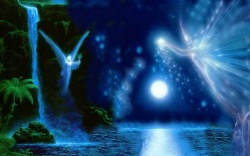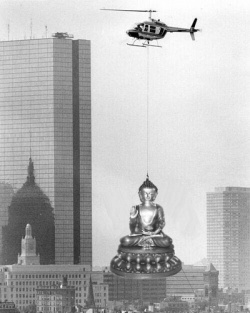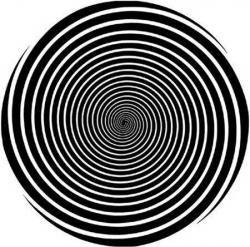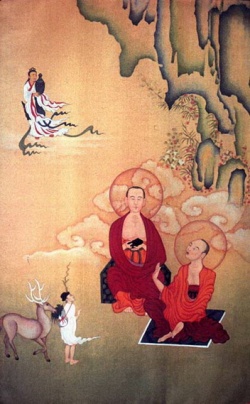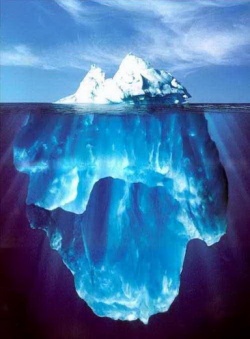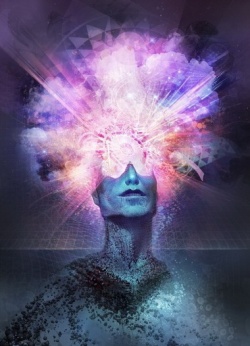Difference between revisions of "Salayatana Vagga: 35: 193: Udayin"
(Created page with "{{DisplayImages|258|926|1076|1163|2036|1948|1744|1112|1702|1493|52|282|824|1536|788|934|391|46|475|125|165|1914|685|2054|596}} {{Centre|<big><big>Saŋyutta Nikaya<br/> Saḷā...") |
|||
| Line 1: | Line 1: | ||
| − | {{DisplayImages|258|926|1076|1163|2036|1948|1744|1112|1702|1493|52|282 | + | {{DisplayImages|258|926|1076|1163|2036|1948|1744|1112|1702|1493|52|282|1536|788|934|391|1914}} |
{{Centre|<big><big>Saŋyutta Nikaya<br/> | {{Centre|<big><big>Saŋyutta Nikaya<br/> | ||
Saḷāyatana Vagga<br/> | Saḷāyatana Vagga<br/> | ||
| Line 12: | Line 12: | ||
I HEAR TELL:<sup>[1]</sup> | I HEAR TELL:<sup>[1]</sup> | ||
| − | [1] Once upon a time, The Elder Ananda and The Elder Udāyin were revisiting Kosambī in Ghosita Park. | + | [1] Once upon a [[time]], The Elder [[Ananda]] and The Elder Udāyin were revisiting [[Kosambī]] in [[Ghosita]] Park. |
| − | [2] At this time The Elder Udāyin, | + | [2] At this [[time]] The Elder Udāyin, |
| − | emerging from solitary meditation towards evening, | + | [[emerging]] from {{Wiki|solitary}} [[meditation]] towards evening, |
| − | went to visit Ananda. | + | went to visit [[Ananda]]. |
| − | [3] Having aproached Ananda, | + | [3] Having aproached [[Ananda]], |
he sat down to one side | he sat down to one side | ||
having sat down to one side, | having sat down to one side, | ||
he asked him: | he asked him: | ||
| − | "In many diverse ways, friend Ananda, | + | "In many diverse ways, [[friend]] [[Ananda]], |
| − | The Bhagava has defined, | + | The [[Bhagava]] has defined, |
explained, | explained, | ||
| − | and expounded upon body, saying: | + | and expounded upon [[body]], saying: |
| − | 'Thus body is not-self.'" | + | 'Thus [[body]] is {{Wiki|not-self}}.'" |
Is it possible also to define, | Is it possible also to define, | ||
explain | explain | ||
| − | and expound upon consciousness | + | and expound upon [[consciousness]] |
such as to make it simple, | such as to make it simple, | ||
clear | clear | ||
and open to examination, saying: | and open to examination, saying: | ||
| − | 'Thus consciousness is not-self.'" | + | 'Thus [[consciousness]] is {{Wiki|not-self}}.'" |
| − | "In many diverse ways, friend Udāyī, | + | "In many diverse ways, [[friend]] Udāyī, |
| − | The Bhagava has defined, | + | The [[Bhagava]] has defined, |
explained, | explained, | ||
| − | and expounded upon body, saying: | + | and expounded upon [[body]], saying: |
| − | 'Thus body is not-self.'" | + | 'Thus [[body]] is {{Wiki|not-self}}.'" |
It is possible also to define, | It is possible also to define, | ||
explain | explain | ||
| − | and expound upon consciousness | + | and expound upon [[consciousness]] |
| − | as being not-self | + | as being {{Wiki|not-self}} |
such as to make it simple, | such as to make it simple, | ||
clear | clear | ||
and open to examination, saying: | and open to examination, saying: | ||
| − | 'Thus consciousness is not-self.'" | + | 'Thus [[consciousness]] is {{Wiki|not-self}}.'" |
| − | [4] The eye, friend, | + | [4] The [[eye]], [[friend]], |
| − | percussing a visible object, | + | percussing a [[visible]] [[object]], |
| − | has eye-consciousness as upshot, | + | has [[eye-consciousness]] as upshot, |
no?[5] | no?[5] | ||
| − | Yes, friend. | + | Yes, [[friend]]. |
| − | If this basis for the appearance of eye-consciousness were to end, | + | If this basis for the [[appearance]] of [[eye-consciousness]] were to end, |
| − | were to become completely extinct in every way; | + | were to become completely [[extinct]] in every way; |
| − | would one be able to point out eye-consciousness? | + | would one be able to point out [[eye-consciousness]]? |
| − | No, friend. | + | No, [[friend]]. |
| − | This is the way, friend, | + | This is the way, [[friend]], |
| − | the Bhagava has defined, | + | the [[Bhagava]] has defined, |
explained | explained | ||
| − | and expounded upon consciousness | + | and expounded upon [[consciousness]] |
| − | as being not-self | + | as being {{Wiki|not-self}} |
such as to make it simple, | such as to make it simple, | ||
clear | clear | ||
and open to examination, saying: | and open to examination, saying: | ||
| − | 'Thus consciousness is not-self.'" | + | 'Thus [[consciousness]] is {{Wiki|not-self}}.'" |
| Line 81: | Line 81: | ||
| − | [5] The ear, friend, | + | [5] The {{Wiki|ear}}, [[friend]], |
| − | percussing a sound, | + | percussing a [[sound]], |
| − | has ear-consciousness as upshot, | + | has [[ear-consciousness]] as upshot, |
no? | no? | ||
| − | Yes, friend. | + | Yes, [[friend]]. |
| − | If this basis for the appearance of ear-consciousness were to end, | + | If this basis for the [[appearance]] of [[ear-consciousness]] were to end, |
| − | were to become completely extinct in every way; | + | were to become completely [[extinct]] in every way; |
| − | would one be able to point out ear-consciousness? | + | would one be able to point out [[ear-consciousness]]? |
| − | No, friend. | + | No, [[friend]]. |
| − | This is the way, friend, | + | This is the way, [[friend]], |
| − | the Bhagava has defined, | + | the [[Bhagava]] has defined, |
explained | explained | ||
| − | and expounded upon consciousness | + | and expounded upon [[consciousness]] |
| − | as being not-self | + | as being {{Wiki|not-self}} |
such as to make it simple, | such as to make it simple, | ||
clear | clear | ||
and open to examination, saying: | and open to examination, saying: | ||
| − | 'Thus consciousness is not-self.'" | + | 'Thus [[consciousness]] is {{Wiki|not-self}}.'" |
| Line 110: | Line 110: | ||
| − | [6] The nose, friend, | + | [6] The {{Wiki|nose}}, [[friend]], |
percussing a scent, | percussing a scent, | ||
| − | has nose-consciousness as upshot, | + | has [[nose-consciousness]] as upshot, |
no? | no? | ||
| − | Yes, friend. | + | Yes, [[friend]]. |
| − | If this basis for the appearance of nose-consciousness were to end, | + | If this basis for the [[appearance]] of [[nose-consciousness]] were to end, |
| − | were to become completely extinct in every way; | + | were to become completely [[extinct]] in every way; |
| − | would one be able to point out nose-consciousness? | + | would one be able to point out [[nose-consciousness]]? |
| − | No, friend. | + | No, [[friend]]. |
| − | This is the way, friend, | + | This is the way, [[friend]], |
| − | the Bhagava has defined, | + | the [[Bhagava]] has defined, |
explained | explained | ||
| − | and expounded upon consciousness | + | and expounded upon [[consciousness]] |
| − | as being not-self | + | as being {{Wiki|not-self}} |
such as to make it simple, | such as to make it simple, | ||
clear | clear | ||
and open to examination, saying: | and open to examination, saying: | ||
| − | 'Thus consciousness is not-self.'" | + | 'Thus [[consciousness]] is {{Wiki|not-self}}.'" |
| Line 139: | Line 139: | ||
| − | [7] The tongue, friend, | + | [7] The {{Wiki|tongue}}, [[friend]], |
percussing a savour, | percussing a savour, | ||
| − | has tongue-consciousness as upshot, | + | has [[tongue-consciousness]] as upshot, |
no? | no? | ||
| − | Yes, friend. | + | Yes, [[friend]]. |
| − | If this basis for the appearance of tongue-consciousness were to end, | + | If this basis for the [[appearance]] of [[tongue-consciousness]] were to end, |
| − | were to become completely extinct in every way; | + | were to become completely [[extinct]] in every way; |
| − | would one be able to point out tongue-consciousness? | + | would one be able to point out [[tongue-consciousness]]? |
| − | No, friend. | + | No, [[friend]]. |
| − | This is the way, friend, | + | This is the way, [[friend]], |
| − | the Bhagava has defined, | + | the [[Bhagava]] has defined, |
explained | explained | ||
| − | and expounded upon consciousness | + | and expounded upon [[consciousness]] |
| − | as being not-self | + | as being {{Wiki|not-self}} |
such as to make it simple, | such as to make it simple, | ||
clear | clear | ||
and open to examination, saying: | and open to examination, saying: | ||
| − | 'Thus consciousness is not-self.'" | + | 'Thus [[consciousness]] is {{Wiki|not-self}}.'" |
| Line 168: | Line 168: | ||
| − | [8] The body, friend, | + | [8] The [[body]], [[friend]], |
| − | percussing a tangible object, | + | percussing a {{Wiki|tangible}} [[object]], |
| − | has body-consciousness as upshot, | + | has [[body-consciousness]] as upshot, |
no? | no? | ||
| − | Yes, friend. | + | Yes, [[friend]]. |
| − | If this basis for the appearance of body-consciousness were to end, | + | If this basis for the [[appearance]] of [[body-consciousness]] were to end, |
| − | were to become completely extinct in every way; | + | were to become completely [[extinct]] in every way; |
| − | would one be able to point out body-consciousness? | + | would one be able to point out [[body-consciousness]]? |
| − | No, friend. | + | No, [[friend]]. |
| − | This is the way, friend, | + | This is the way, [[friend]], |
| − | the Bhagava has defined, | + | the [[Bhagava]] has defined, |
explained | explained | ||
| − | and expounded upon consciousness | + | and expounded upon [[consciousness]] |
| − | as being not-self | + | as being {{Wiki|not-self}} |
such as to make it simple, | such as to make it simple, | ||
clear | clear | ||
and open to examination, saying: | and open to examination, saying: | ||
| − | 'Thus consciousness is not-self.'" | + | 'Thus [[consciousness]] is {{Wiki|not-self}}.'" |
| Line 197: | Line 197: | ||
| − | [9] The mind, friend, | + | [9] The [[mind]], [[friend]], |
percussing things, | percussing things, | ||
| − | has mind-consciousness as upshot, | + | has [[mind-consciousness]] as upshot, |
no?<sup>[2]</sup> | no?<sup>[2]</sup> | ||
| − | Yes, friend. | + | Yes, [[friend]]. |
| − | If this basis for the appearance of mind-consciousness were to end, | + | If this basis for the [[appearance]] of [[mind-consciousness]] were to end, |
| − | were to become completely extinct in every way; | + | were to become completely [[extinct]] in every way; |
| − | would one be able to point out mind-consciousness? | + | would one be able to point out [[mind-consciousness]]? |
| − | No, friend. | + | No, [[friend]]. |
| − | This is the way, friend, | + | This is the way, [[friend]], |
| − | the Bhagava has defined, | + | the [[Bhagava]] has defined, |
explained | explained | ||
| − | and expounded upon consciousness | + | and expounded upon [[consciousness]] |
| − | as being not-self | + | as being {{Wiki|not-self}} |
such as to make it simple, | such as to make it simple, | ||
clear | clear | ||
and open to examination, saying: | and open to examination, saying: | ||
| − | 'Thus consciousness is not-self.'" | + | 'Thus [[consciousness]] is {{Wiki|not-self}}.'" |
| Line 226: | Line 226: | ||
| − | [10] In the same way as a woodsman, friend, | + | [10] In the same way as a woodsman, [[friend]], |
in need of heart-wood, | in need of heart-wood, | ||
should take his sharp axe | should take his sharp axe | ||
| Line 234: | Line 234: | ||
young, growing straight and tall, | young, growing straight and tall, | ||
of a great height, | of a great height, | ||
| − | and he cuts it down at the root, | + | and he cuts it down at the [[root]], |
| − | cuts it off at the crown | + | cuts it off at the {{Wiki|crown}} |
and peels off the outer bark: | and peels off the outer bark: | ||
not only would he find no heart-wood, | not only would he find no heart-wood, | ||
he would find no center-wood at all!<sup>[4]</sup> | he would find no center-wood at all!<sup>[4]</sup> | ||
| − | [11] In the same way, friend, | + | [11] In the same way, [[friend]], |
| − | a beggar can find no self | + | a {{Wiki|beggar}} can find [[no self]] |
| − | or thing belonging to self | + | or thing belonging to [[self]] |
| − | in the realm of the senses. | + | in the [[realm]] of the [[senses]]. |
| − | This is the way, friend, | + | This is the way, [[friend]], |
| − | the Bhagava has defined, | + | the [[Bhagava]] has defined, |
explained | explained | ||
| − | and expounded upon consciousness | + | and expounded upon [[consciousness]] |
| − | as being not-self | + | as being {{Wiki|not-self}} |
such as to make it simple, | such as to make it simple, | ||
clear | clear | ||
and open to examination, saying: | and open to examination, saying: | ||
| − | 'Thus consciousness is not-self.' | + | 'Thus [[consciousness]] is {{Wiki|not-self}}.' |
</poem> | </poem> | ||
==Footnotes== | ==Footnotes== | ||
| − | [1]Not in the Pali. | + | [1]Not in the [[Pali]]. |
| − | [2]Manañcā paṭicca dhamme ca. We need to be hearing this as "brain" and mental objects in the same way as when the eye is referenced we think of our own eye and external sights. From there we see that the trick of this sutta is that the previous five consciousnesses become the sense-objects (phenomena) that together with 'brain' are the cause of 'mental consciousness' or the consciousness with which we are ordinarily associating the self. So the hearer has to this point clearly seen how the other senses depend on a sense organ and sense object and so is forced to accept the notion that the mind operates in exactly the same way and is just as impersonal. | + | [2]Manañcā paṭicca dhamme ca. We need to be hearing this as "{{Wiki|brain}}" and {{Wiki|mental objects}} in the same way as when the [[eye]] is referenced we think of our own [[eye]] and external sights. From there we see that the trick of this [[sutta]] is that the previous [[five consciousnesses]] become the [[sense-objects]] ([[phenomena]]) that together with '{{Wiki|brain}}' are the [[cause]] of '[[mental consciousness]]' or the [[consciousness]] with which we are ordinarily associating the [[self]]. So the hearer has to this point clearly seen how the other [[senses]] depend on a [[sense organ]] and [[sense object]] and so is forced to accept the notion that the [[mind]] operates in exactly the same way and is just as impersonal. |
| − | [3]Khandha. | + | [3][[Khandha]]. |
| − | [4]In the west, where the plantain tree is not well-known, we might be given a better mental image if we think of the onion. | + | [4]In the [[west]], where the plantain [[tree]] is not well-known, we might be given a better [[mental]] image if we think of the onion. |
| − | [5]Cakkhuñc'āvuso paṭicca rūpe ca uppajjati cakkhuviññāṇanti.|| || Eye-stuff, friend, percussing form-stuff: upbirth? eye-consciousness, say? | + | [5]Cakkhuñc'āvuso paṭicca rūpe ca uppajjati cakkhuviññāṇanti.|| || Eye-stuff, [[friend]], percussing form-stuff: upbirth? [[eye-consciousness]], say? |
===References:=== | ===References:=== | ||
| − | Saŋyutta Nikaya IV: Sa'ayatana Saŋyutta: Samudda-Vaggo 3rd: PTS: page 166 | + | [[Saŋyutta]] [[Nikaya]] IV: Sa'ayatana [[Saŋyutta]]: Samudda-Vaggo 3rd: PTS: page 166 |
| − | PTS: Book of the Kindred Sayings IV: The Salayatana Book, Udayin, Woodward, trans, pp. 102 | + | PTS: [[Book]] of the [[Kindred Sayings]] IV: The [[Salayatana]] [[Book]], Udayin, Woodward, trans, pp. 102 |
| − | WP: The Connected Discourses of the Buddha, 234: Udayi, Bhk Bodhi, trans., II.1232 | + | WP: The [[Connected Discourses]] of the [[Buddha]], 234: [[Udayi]], Bhk [[Bodhi]], trans., II.1232 |
{{R}} | {{R}} | ||
Revision as of 17:43, 31 December 2013
Saŋyutta Nikaya
Saḷāyatana Vagga
35. Saḷāyatanasaŋyutta
Sutta 193
Udayin
Translated from the Pali by Michael Olds
I HEAR TELL:[1]
[1] Once upon a time, The Elder Ananda and The Elder Udāyin were revisiting Kosambī in Ghosita Park.
[2] At this time The Elder Udāyin,
emerging from solitary meditation towards evening,
went to visit Ananda.
[3] Having aproached Ananda,
he sat down to one side
having sat down to one side,
he asked him:
"In many diverse ways, friend Ananda,
The Bhagava has defined,
explained,
and expounded upon body, saying:
'Thus body is not-self.'"
Is it possible also to define,
explain
and expound upon consciousness
such as to make it simple,
clear
and open to examination, saying:
'Thus consciousness is not-self.'"
"In many diverse ways, friend Udāyī,
The Bhagava has defined,
explained,
and expounded upon body, saying:
'Thus body is not-self.'"
It is possible also to define,
explain
and expound upon consciousness
as being not-self
such as to make it simple,
clear
and open to examination, saying:
'Thus consciousness is not-self.'"
[4] The eye, friend,
percussing a visible object,
has eye-consciousness as upshot,
no?[5]
Yes, friend.
If this basis for the appearance of eye-consciousness were to end,
were to become completely extinct in every way;
would one be able to point out eye-consciousness?
No, friend.
This is the way, friend,
the Bhagava has defined,
explained
and expounded upon consciousness
as being not-self
such as to make it simple,
clear
and open to examination, saying:
'Thus consciousness is not-self.'"
§
[5] The ear, friend,
percussing a sound,
has ear-consciousness as upshot,
no?
Yes, friend.
If this basis for the appearance of ear-consciousness were to end,
were to become completely extinct in every way;
would one be able to point out ear-consciousness?
No, friend.
This is the way, friend,
the Bhagava has defined,
explained
and expounded upon consciousness
as being not-self
such as to make it simple,
clear
and open to examination, saying:
'Thus consciousness is not-self.'"
§
[6] The nose, friend,
percussing a scent,
has nose-consciousness as upshot,
no?
Yes, friend.
If this basis for the appearance of nose-consciousness were to end,
were to become completely extinct in every way;
would one be able to point out nose-consciousness?
No, friend.
This is the way, friend,
the Bhagava has defined,
explained
and expounded upon consciousness
as being not-self
such as to make it simple,
clear
and open to examination, saying:
'Thus consciousness is not-self.'"
§
[7] The tongue, friend,
percussing a savour,
has tongue-consciousness as upshot,
no?
Yes, friend.
If this basis for the appearance of tongue-consciousness were to end,
were to become completely extinct in every way;
would one be able to point out tongue-consciousness?
No, friend.
This is the way, friend,
the Bhagava has defined,
explained
and expounded upon consciousness
as being not-self
such as to make it simple,
clear
and open to examination, saying:
'Thus consciousness is not-self.'"
§
[8] The body, friend,
percussing a tangible object,
has body-consciousness as upshot,
no?
Yes, friend.
If this basis for the appearance of body-consciousness were to end,
were to become completely extinct in every way;
would one be able to point out body-consciousness?
No, friend.
This is the way, friend,
the Bhagava has defined,
explained
and expounded upon consciousness
as being not-self
such as to make it simple,
clear
and open to examination, saying:
'Thus consciousness is not-self.'"
§
[9] The mind, friend,
percussing things,
has mind-consciousness as upshot,
no?[2]
Yes, friend.
If this basis for the appearance of mind-consciousness were to end,
were to become completely extinct in every way;
would one be able to point out mind-consciousness?
No, friend.
This is the way, friend,
the Bhagava has defined,
explained
and expounded upon consciousness
as being not-self
such as to make it simple,
clear
and open to examination, saying:
'Thus consciousness is not-self.'"
§
[10] In the same way as a woodsman, friend,
in need of heart-wood,
should take his sharp axe
and setting out to find heart-wood,
meandering around looking for heart-wood,
should come upon a great plaintain trunk[3]
young, growing straight and tall,
of a great height,
and he cuts it down at the root,
cuts it off at the crown
and peels off the outer bark:
not only would he find no heart-wood,
he would find no center-wood at all![4]
[11] In the same way, friend,
a beggar can find no self
or thing belonging to self
in the realm of the senses.
This is the way, friend,
the Bhagava has defined,
explained
and expounded upon consciousness
as being not-self
such as to make it simple,
clear
and open to examination, saying:
'Thus consciousness is not-self.'
Footnotes
[1]Not in the Pali.
[2]Manañcā paṭicca dhamme ca. We need to be hearing this as "brain" and mental objects in the same way as when the eye is referenced we think of our own eye and external sights. From there we see that the trick of this sutta is that the previous five consciousnesses become the sense-objects (phenomena) that together with 'brain' are the cause of 'mental consciousness' or the consciousness with which we are ordinarily associating the self. So the hearer has to this point clearly seen how the other senses depend on a sense organ and sense object and so is forced to accept the notion that the mind operates in exactly the same way and is just as impersonal.
[3]Khandha.
[4]In the west, where the plantain tree is not well-known, we might be given a better mental image if we think of the onion.
[5]Cakkhuñc'āvuso paṭicca rūpe ca uppajjati cakkhuviññāṇanti.|| || Eye-stuff, friend, percussing form-stuff: upbirth? eye-consciousness, say?
References:
Saŋyutta Nikaya IV: Sa'ayatana Saŋyutta: Samudda-Vaggo 3rd: PTS: page 166
PTS: Book of the Kindred Sayings IV: The Salayatana Book, Udayin, Woodward, trans, pp. 102
WP: The Connected Discourses of the Buddha, 234: Udayi, Bhk Bodhi, trans., II.1232


